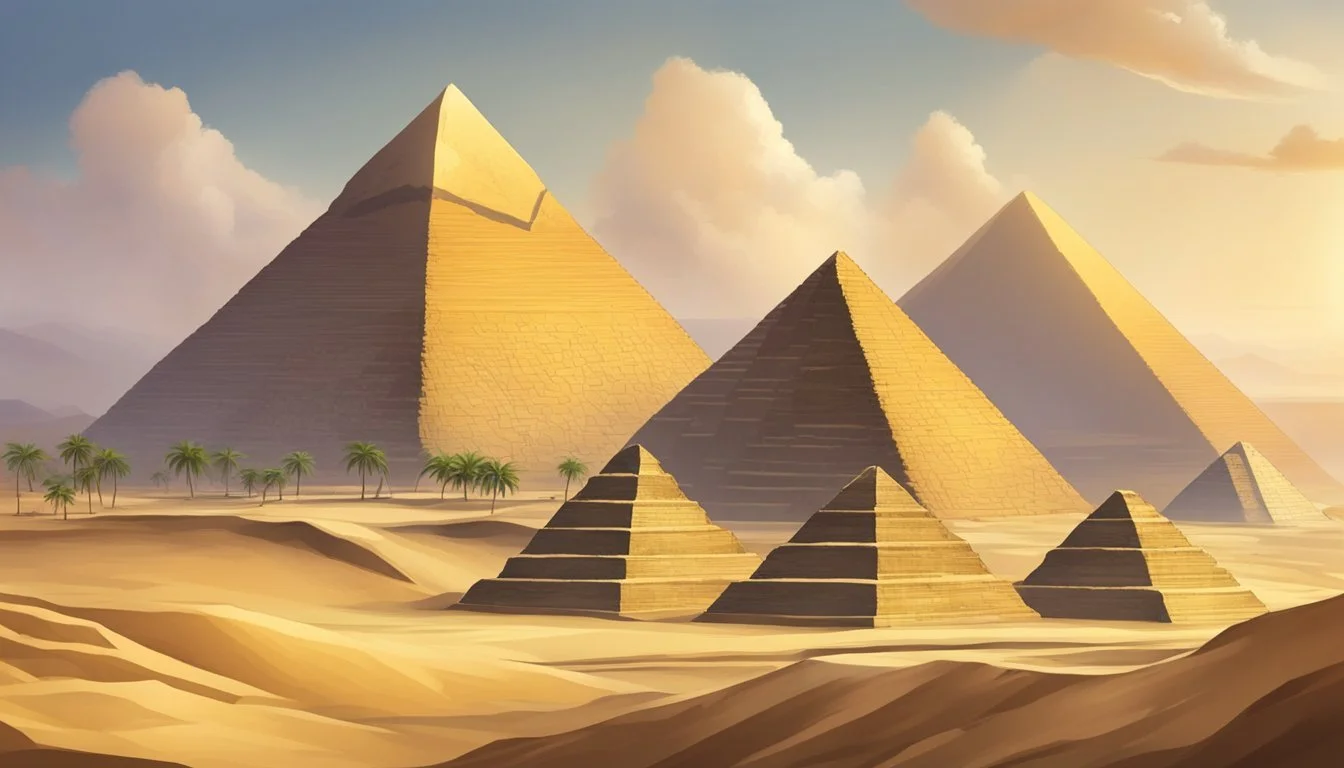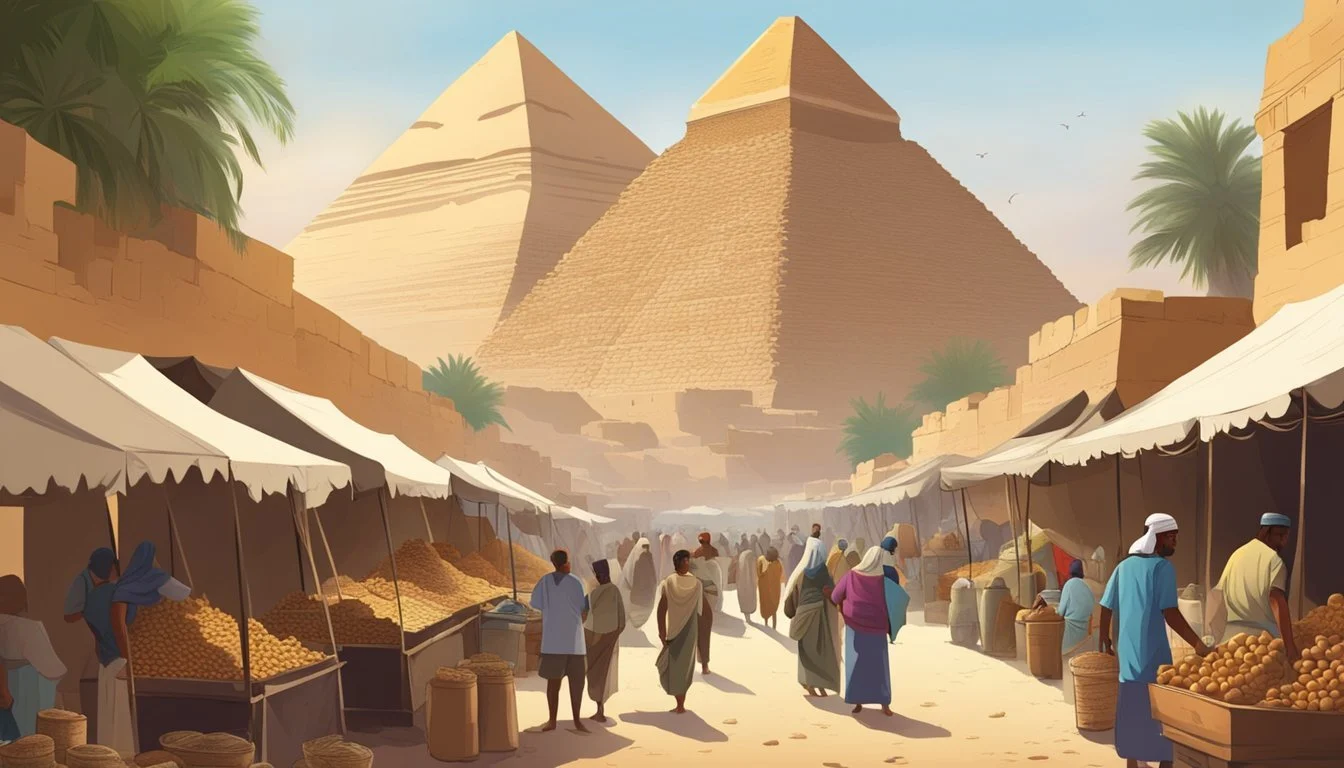9 Thought-Provoking Documentaries About Egypt
Unveiling Ancient Mysteries and Modern Realities
Ancient Egypt continues to captivate people around the world with its rich history, fascinating culture, and monumental achievements. From the Great Pyramids to the enigmatic Sphinx, this ancient civilization left behind a legacy that has sparked curiosity and wonder for centuries.
Documentaries offer a unique window into the world of ancient Egypt, allowing viewers to explore its mysteries and uncover new insights. These films combine expert analysis, archaeological discoveries, and cutting-edge technology to bring the past to life, providing a deeper understanding of this remarkable civilization and its enduring impact on human history.
1) 13th
"13th" is a powerful documentary directed by Ava DuVernay, released in 2016. The film examines the intersection of race, justice, and mass incarceration in the United States.
It takes its title from the 13th Amendment to the U.S. Constitution, which abolished slavery except as punishment for a crime. The documentary argues that this loophole has been exploited to perpetuate racial inequality through the criminal justice system.
DuVernay presents a compelling case using archival footage, interviews with scholars, activists, and politicians. The film traces the history of racial oppression from the end of the Civil War through the War on Drugs and the rise of the prison-industrial complex.
"13th" received critical acclaim for its in-depth analysis and thought-provoking content. It was nominated for an Academy Award for Best Documentary Feature and won numerous other accolades.
The documentary has been praised for its ability to educate viewers on complex issues of systemic racism and criminal justice reform. It has become an important resource for those seeking to understand and address racial disparities in the American legal system.
2) The Square
"The Square" is a powerful documentary directed by Jehane Noujaim that chronicles the Egyptian Revolution of 2011. The film focuses on the experiences of three individuals during the tumultuous events in Tahrir Square, Cairo.
Noujaim's camera captures the raw emotion and intensity of the protests, providing viewers with an intimate look at the revolution as it unfolds. The documentary showcases the passion and determination of the Egyptian people fighting for change.
The film's strength lies in its ability to humanize the revolution through personal stories. It follows Ahmed, Khalid, and other key figures as they navigate the complexities of political upheaval and social transformation.
"The Square" offers a unique perspective on the Egyptian Revolution by presenting events through the eyes of the revolutionaries themselves. This approach allows viewers to connect with the struggles and hopes of those on the ground.
The documentary received critical acclaim for its immersive storytelling and unflinching portrayal of a nation in crisis. It provides valuable insights into the ongoing challenges faced by Egypt in the aftermath of the revolution.
3) The Nile Hilton Incident
"The Nile Hilton Incident" is a 2017 Swedish thriller film directed by Tarik Saleh. Set in Cairo just before the 2011 Egyptian Revolution, the movie provides a gritty look at corruption within the Egyptian police force.
The film follows a police detective investigating a murder at an upscale hotel. As he delves deeper into the case, he encounters resistance from powerful figures who want to keep the truth hidden.
Fares Fares stars as the lead detective, delivering a compelling performance alongside a talented cast. The film's cinematography captures Cairo's atmosphere, creating a visually striking noir aesthetic.
"The Nile Hilton Incident" received critical acclaim and won the World Cinema Grand Jury Prize: Dramatic at the 2017 Sundance Film Festival. It offers a thought-provoking exploration of power dynamics and societal issues in pre-revolution Egypt.
While taking creative liberties with historical details, the film provides insight into the tensions and corruption that contributed to the Egyptian Revolution. Its blend of crime thriller elements and social commentary makes it a captivating watch for those interested in Egyptian politics and society.
4) Mysteries of Egypt
"Mysteries of Egypt" is a captivating documentary that delves into the enigmatic world of ancient Egyptian civilization. Produced by National Geographic, this film takes viewers on a journey through time, exploring the secrets of the pyramids and the Sphinx.
The documentary examines the advanced engineering techniques used by ancient Egyptians to construct their monumental structures. It presents theories about how these massive edifices were built without modern technology.
Narrated by Omar Sharif, the film offers stunning visuals of Egypt's iconic landmarks. It showcases the intricate hieroglyphics and elaborate tomb decorations that have fascinated archaeologists for centuries.
The documentary also explores the ancient Egyptian belief system, including their complex mythology and afterlife concepts. It discusses the mummification process and the significance of burial rituals in Egyptian culture.
"Mysteries of Egypt" provides insights into the lives of pharaohs and their roles in ancient Egyptian society. It examines the power dynamics and social structures that shaped this remarkable civilization.
5) Secrets of the Saqqara Tomb
Secrets of the Saqqara Tomb is a 2020 British documentary that offers viewers an unprecedented look into an ancient Egyptian discovery. The film follows a team of Egyptian archaeologists as they unearth and explore a tomb in the Saqqara necropolis near Cairo.
The tomb, untouched for 4,400 years, dates back to the 25th century BC. This remarkable find provides a unique opportunity to study a perfectly preserved piece of ancient Egyptian history.
The documentary chronicles the meticulous work of the archaeological team as they carefully excavate the site. Their efforts reveal fascinating insights into the life and death of the tomb's owner.
Viewers are treated to stunning visuals of the excavation process and the intricate artifacts uncovered within the tomb. The film combines these visuals with expert commentary to bring the ancient world to life.
Secrets of the Saqqara Tomb offers a fresh perspective on Egyptology, moving beyond traditional Western narratives. It showcases the dedication and expertise of Egyptian archaeologists in uncovering their own history.
This documentary appeals to history enthusiasts, archaeology buffs, and anyone curious about ancient Egyptian culture. It provides a captivating blend of scientific discovery and historical exploration.
6) Tutankhamun: Life, Death and Legacy
This documentary explores the fascinating story of Egypt's boy pharaoh, Tutankhamun. It delves into the daily life of the young king who ascended to the throne at just 8 or 9 years old.
The film investigates Tutankhamun's sudden death at 19, which sent shockwaves through ancient Egypt. It examines the scientific analysis of his mummified body, revealing insights into his health and possible causes of death.
The documentary also recounts the discovery of Tutankhamun's tomb by Howard Carter in 1922. It showcases the breathtaking treasures found within, including the famous golden death mask.
Through modern scientific techniques, the film sheds light on the final 100 days of Tutankhamun's reign. It offers a glimpse into the advanced civilization of ancient Egypt during his time.
The documentary provides a comprehensive look at Tutankhamun's short life, mysterious death, and enduring legacy. It combines historical research with cutting-edge forensic analysis to paint a vivid picture of this iconic pharaoh.
7) The Pyramid Code
The Pyramid Code is a five-part documentary series that delves into the mysteries of ancient Egypt. It explores pyramid fields and ancient temples across Egypt, as well as megalithic sites worldwide.
The series is based on extensive research conducted over 23 trips to Egypt and visits to 50 other countries. It aims to uncover clues about ancient knowledge, sophisticated technology, and matriarchal consciousness during a proposed Golden Age.
Directed by Carmen Boulter, the documentary features insights from various experts and researchers. It examines alternative theories about the purpose and construction of the pyramids, challenging conventional historical narratives.
The series investigates the possibility of advanced technologies used by ancient Egyptians. It also explores connections between Egyptian sites and other ancient structures around the world.
The Pyramid Code offers viewers a fresh perspective on ancient Egyptian civilization. It encourages audiences to question established beliefs about humanity's past and the capabilities of ancient cultures.
8) Egypt: The Heart of the Earth
"Egypt: The Heart of the Earth" is a captivating documentary that explores the ancient civilization's profound connection to its environment. The film delves into how the Nile River shaped Egyptian culture, agriculture, and beliefs.
Viewers are taken on a journey through time, witnessing the ingenious ways Egyptians harnessed the river's annual floods. The documentary showcases the sophisticated irrigation systems that transformed desert lands into fertile fields.
Ancient Egyptian religious practices and their ties to natural phenomena are examined in detail. The film highlights how deities were often associated with elements of the natural world, reflecting the Egyptians' deep reverence for their surroundings.
The documentary also investigates the impact of climate change on ancient Egyptian society. It presents evidence of how shifting weather patterns influenced the rise and fall of dynasties over millennia.
Archaeological discoveries featured in the film shed light on the Egyptians' advanced understanding of astronomy and its application in agriculture and architecture. The precise alignment of monuments with celestial bodies demonstrates their mastery of natural cycles.
9) Egypt's Sun King: The Mystery of Amenhotep III
Amenhotep III, also known as the Sun King, reigned during Egypt's 18th Dynasty from approximately 1386 to 1353 BCE. This documentary explores the life and legacy of one of Egypt's greatest pharaohs.
The film delves into Amenhotep III's ambitious building projects, including his extensive work at the Temple of Amun in Karnak. It examines his remodeling efforts, which involved dismantling existing structures to create new entrances and features.
Viewers learn about the pharaoh's relationships with the women in his life, offering insights into the royal court of ancient Egypt. The documentary also sheds light on Queen Tiye, Amenhotep III's principal wife and an influential figure in her own right.
A significant focus of the film is the rediscovery of Amenhotep III's mortuary temple. This massive structure, once lost to time, is revealed to be the largest temple ever built in ancient Egypt.
The documentary uses a combination of archaeological evidence, historical records, and expert analysis to paint a comprehensive picture of Amenhotep III's reign. It highlights his contributions to Egyptian art and architecture, which influenced future generations, including his famous descendant Tutankhamun.
Historical Context of Egypt's Documentary Cinema
Egypt's documentary film tradition spans nearly a century, reflecting the nation's rich cultural heritage and evolving social landscape. This history encompasses pioneering filmmakers and shifting thematic focuses that mirror Egypt's changing society.
Pioneers of Egyptian Documentary Filmmaking
Egypt's documentary cinema roots trace back to the 1920s. Mohammed Bayoumi, often considered the father of Egyptian cinema, produced the first Egyptian documentary in 1923. His work "In the Land of Tutankhamun" captured archaeological excavations, setting a precedent for future documentarians.
In the 1950s, Salah Abu Seif emerged as a prominent figure, bridging fiction and non-fiction filmmaking. His documentaries explored social issues and everyday Egyptian life. The 1960s saw the rise of Shadi Abdel Salam, whose films like "The Night of Counting the Years" blended documentary and narrative techniques to explore Egypt's ancient history.
Evolution of Themes in Egyptian Documentaries
Early Egyptian documentaries often focused on pharaonic history and archaeological discoveries, capitalizing on global fascination with ancient Egypt. This trend persisted but evolved to include more critical examinations of historical narratives.
Post-1952 revolution, themes shifted towards social and political issues. Filmmakers like Youssef Chahine incorporated documentary elements in their work to address contemporary Egyptian society. The 1970s and 1980s saw an increase in documentaries exploring urban life, rural traditions, and the impacts of modernization.
Recent decades have witnessed a surge in documentaries tackling controversial topics. Filmmakers now explore issues like gender roles, religious tensions, and political upheavals, reflecting Egypt's complex modern realities.
Cultural Insights Through Egyptian Documentaries
Documentaries about Egypt offer viewers a window into the country's rich cultural heritage and contemporary society. These films provide valuable insights into ancient traditions and modern life in Egypt.
Depictions of Ancient Civilizations
Documentaries exploring ancient Egypt often focus on the construction of the pyramids and the lives of pharaohs. "Egypt: Secrets of the Pharaohs" by National Geographic examines pyramid building techniques and dispels common myths. The film also highlights the discovery of Pharaoh Khufu's ship, preserved in an underground vault.
Some documentaries delve into the unique beliefs and practices of ancient Egyptians. They explore the intricate rituals surrounding death and the afterlife, which played a central role in Egyptian culture. These films often showcase elaborate tomb decorations and mummification processes.
Exploring Modern Egyptian Society
Contemporary documentaries shed light on present-day Egypt and its cultural dynamics. They often examine the blend of ancient traditions with modern influences in Egyptian society. These films may explore topics such as urban life in Cairo, rural communities along the Nile, and the role of religion in daily life.
Some documentaries focus on Egyptian folklore and storytelling traditions that have been passed down through generations. They may feature interviews with local artists, musicians, and craftspeople who keep traditional practices alive. These films provide insights into how Egyptians preserve their cultural heritage while adapting to a rapidly changing world.




